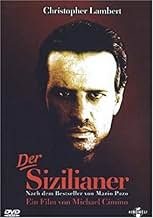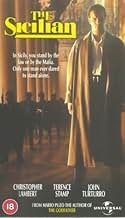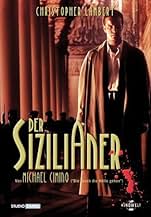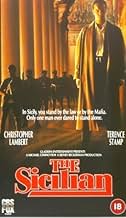NOTE IMDb
5,4/10
5,7 k
MA NOTE
Le bandit égocentrique Salvatore Giuliano combat l'Église, la mafia et la noblesse terrienne tout en dirigeant un mouvement populiste qui se bat pour l'indépendance sicilienne.Le bandit égocentrique Salvatore Giuliano combat l'Église, la mafia et la noblesse terrienne tout en dirigeant un mouvement populiste qui se bat pour l'indépendance sicilienne.Le bandit égocentrique Salvatore Giuliano combat l'Église, la mafia et la noblesse terrienne tout en dirigeant un mouvement populiste qui se bat pour l'indépendance sicilienne.
- Réalisation
- Scénario
- Casting principal
Avis à la une
This film is not as bad as many say. It is somewhat melodramatic at times, but not too often. I really enjoy watching it and recommend it. The main problems with the movie are, the music and acting. The opening song in the film is great and it leads you to believe the film will be a near masterpiece. But there is this one song that is used during some romantic moments, and it just plain sucks. It kills any effect the film had. Then there is the acting. Lambert is one of the worst actors i have ever seen. Simple. However, this movie is probably his best work. The violence in the film is intense which keeps your attention and the cinematography is rather beautiful (One of Cimino's greatest abilities) So, if you can find a copy, watch it.
Cimino is one of the very rare species on earth that can create a "MOOD' that leads to the very cradle of western civilization. The Roman Empire. As a foreigner who has lived in an Italian town for a year, I come to see that the colossal heart of every Italian man can only be captured with its gist by Cimino. And no other up till date. It comes from lighting, its shadow, its colours, its smell even on screen, its silhouettes, its accents, its breathing space, and his very own colossal heart that can contain it all. You do feel that he has achieved that sacred task in showing us THE SICILIAN. Nobody has that feeling ever been captured with rapture that its texture is almost noble, royal, yet sacred. But in its careful craftsmanship of Cimino, you find it everywhere, and it is just everywhere that overflows: its costumes, its lighting, its camerawork, its juxtaposition, its projections, so on and so forth. Its tempo of the film makes you flow like a river that breeds lives and cultures at the very same time.
One of the underlying problems with Michael Cimino's film is that it makes the remarkable Sicilian countryside do too much of the narrative work. If you were to watch the film with the sound turned off -- saving you from the stilted dialogue and the gushy score -- you might think much better of the whole enterprise, so powerful is the photography of those rugged mountains and steep canyons. But everything is so visually splendid that it undermines any sense that the poor are actually suffering and starving out there. A travelogue does not always make for good storytelling. And, of course, the pan-and-scan version, the only one currently available on DVD, chops out most of the landscape, limiting the impact of the movie's visual achievement.
Another problem for Cimino's film is that there's actually a much better version of the same story from an earlier director. Few people seem to be aware of the earlier treatment. In 1962, the great Italian director Francesco Rosi released his superb version under the title "Salvatore Giuliano." It's in black and white, but gloriously so. The massacre of the peasants in Rosi's version is one of the most heartbreaking and dramatically memorable sequences in the history of Italian film. And throughout, the dark ambiguity of the main character remains consistently compelling, within a far more complex storytelling mode than Cimino's surprisingly straightforward Hollywood-inflected retelling. The Rosi film deserves to be much better known.
Another problem for Cimino's film is that there's actually a much better version of the same story from an earlier director. Few people seem to be aware of the earlier treatment. In 1962, the great Italian director Francesco Rosi released his superb version under the title "Salvatore Giuliano." It's in black and white, but gloriously so. The massacre of the peasants in Rosi's version is one of the most heartbreaking and dramatically memorable sequences in the history of Italian film. And throughout, the dark ambiguity of the main character remains consistently compelling, within a far more complex storytelling mode than Cimino's surprisingly straightforward Hollywood-inflected retelling. The Rosi film deserves to be much better known.
For entertainment value, Cimino's 'The Sicilian' does not deliver in the Hollywood sense. That's good in my opinion.
It viewed some where between documentary and romantic fairy tale. Maybe to many, the latter choice would be more appropriate. I'd place Sicilian, Salvatore Giuliano or Lambert's portrayal smack in the middle. That's because even after doing much research I'm still not sure who the real character was. Probably, no one really knows for sure.
The plot moves along fine except for the opening flashback from Turturro's cell. Cimino should have axed the scene first cut. The inclusion of the American governess did not help the story line either. In fact, she, the actress gave an unconvincing and unflattering portrayal of Americans (the rich ones) living abroad. At times she swore like a trooper. Most of the film she sounded and looked like a hooker in communist garb, designer that is. I was so glad when she fell off the reel.
The rest of supporting cast was complementary. Giuliano's accomplices were good enough and just bad enough to add intrigue. Even the crotchety old professor was a good fit as interlocutor between Giuliano, his loyal band of unhappy bandits, the fickle mob and the stripe changing church.
The film's one weakness is the behind the scene's love affair between the Mafia Don and Giuliano. I found it confusing. Do competing mobsters profess such unrequited love? Perhaps they do in Sicily.
If you're looking for something in the genre of the non-stop murderous mobster films, then give this one a miss. However, if you are fascinated with Sicily and their mysterious culture, 'The Sicilian' will give you some good glimpses of the stunning mountain terrain, cosmopolitan Palermo and its people both big and small, good and bad.
It viewed some where between documentary and romantic fairy tale. Maybe to many, the latter choice would be more appropriate. I'd place Sicilian, Salvatore Giuliano or Lambert's portrayal smack in the middle. That's because even after doing much research I'm still not sure who the real character was. Probably, no one really knows for sure.
The plot moves along fine except for the opening flashback from Turturro's cell. Cimino should have axed the scene first cut. The inclusion of the American governess did not help the story line either. In fact, she, the actress gave an unconvincing and unflattering portrayal of Americans (the rich ones) living abroad. At times she swore like a trooper. Most of the film she sounded and looked like a hooker in communist garb, designer that is. I was so glad when she fell off the reel.
The rest of supporting cast was complementary. Giuliano's accomplices were good enough and just bad enough to add intrigue. Even the crotchety old professor was a good fit as interlocutor between Giuliano, his loyal band of unhappy bandits, the fickle mob and the stripe changing church.
The film's one weakness is the behind the scene's love affair between the Mafia Don and Giuliano. I found it confusing. Do competing mobsters profess such unrequited love? Perhaps they do in Sicily.
If you're looking for something in the genre of the non-stop murderous mobster films, then give this one a miss. However, if you are fascinated with Sicily and their mysterious culture, 'The Sicilian' will give you some good glimpses of the stunning mountain terrain, cosmopolitan Palermo and its people both big and small, good and bad.
This is a very well made movie, especially as it concerns scenery and camera angles. However, the tempo of the movie is a little slow and after the initial fifteen minutes or so its seems to emphasize a lot on character development rather then unraveling a plot quickly to keep you interested. This movie gave me the impression that it was intended for a more subdued audience. Eventually it picks up here and there with some violent retribution from those that have betrayed Giuliano.
I can't emphasis enough about the scenery since that seemed to compensate for the poor dialogue a lot of the time. John Turturro was great in this movie as well as Chris Lambert. The character of Don Masino carried this movie as your classic stolid and shrewed mafia boss and Giuliano, whom Masino admires, poses a threat to his power.
I can't emphasis enough about the scenery since that seemed to compensate for the poor dialogue a lot of the time. John Turturro was great in this movie as well as Chris Lambert. The character of Don Masino carried this movie as your classic stolid and shrewed mafia boss and Giuliano, whom Masino admires, poses a threat to his power.
Le saviez-vous
- AnecdotesThe novel is a spin-off of The Godfather (set during Michael's exile in Sicily), however all references to the Corleones are omitted from the film.
- GaffesThe film shows Giuliano trying to stop the massacre at Portella della Ginestre (blamed in the film on Terranova, who was one of the few of Giuliano's band who it's definitely known did NOT fire a single shot on that day). In reality Giuliano always accepted full responsibility for the massacre and expressed no sorrow for the victims.
- Citations
Salvatore Giuliano: You're an American, aren't you?
Camilla, Duchess of Crotone: Yes, and like every other Sicilian you want to go to America and start a pizzaria in Jersey.
- Crédits fousThe 20th Century Fox logo is in black-and-white.
- Versions alternativesOriginally released at 115 minutes in the USA. A 146-minutes director's cut is available on video and at least in Europe as a region 2 DVD.
- ConnexionsEdited into Lo schermo a tre punte (1995)
- Bandes originalesDomanda al ciel ... Dio, che nell'alma infondere
from "Don Carlo, Act II"
Written by Giuseppe Verdi
Performed by Enrico Caruso and Antonio Scotti
Meilleurs choix
Connectez-vous pour évaluer et suivre la liste de favoris afin de recevoir des recommandations personnalisées
- How long is The Sicilian?Alimenté par Alexa
Détails
Box-office
- Budget
- 9 000 000 $US (estimé)
- Montant brut aux États-Unis et au Canada
- 5 406 879 $US
- Week-end de sortie aux États-Unis et au Canada
- 1 720 351 $US
- 25 oct. 1987
- Montant brut mondial
- 5 406 879 $US
- Durée
- 1h 55min(115 min)
- Couleur
- Rapport de forme
- 2.35 : 1
Contribuer à cette page
Suggérer une modification ou ajouter du contenu manquant






































